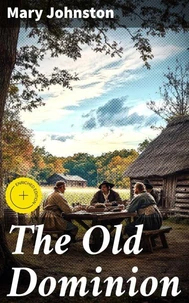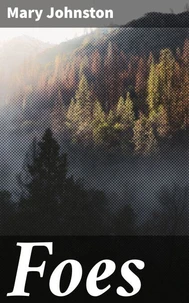1492
Par :Formats :
Disponible dans votre compte client Decitre ou Furet du Nord dès validation de votre commande. Le format ePub est :
- Compatible avec une lecture sur My Vivlio (smartphone, tablette, ordinateur)
- Compatible avec une lecture sur liseuses Vivlio
- Pour les liseuses autres que Vivlio, vous devez utiliser le logiciel Adobe Digital Edition. Non compatible avec la lecture sur les liseuses Kindle, Remarkable et Sony
 , qui est-ce ?
, qui est-ce ?Notre partenaire de plateforme de lecture numérique où vous retrouverez l'ensemble de vos ebooks gratuitement
Pour en savoir plus sur nos ebooks, consultez notre aide en ligne ici
- Nombre de pages243
- FormatePub
- ISBN859-65--4717483-7
- EAN8596547174837
- Date de parution15/08/2022
- Protection num.Digital Watermarking
- Taille571 Ko
- Infos supplémentairesepub
- ÉditeurDIGICAT
Résumé
In Mary Johnston's historical novel "1492, " the author artfully navigates the turbulent waters of exploration and conquest during a pivotal moment in history. Through a vivid narrative infused with rich detail and lyrical prose, she chronicles the voyages and discoveries of Christopher Columbus, juxtaposing the awe of exploration with the harrowing consequences of European colonization. Johnston's sophisticated style melds historical accuracy with fictional embellishment, allowing readers to experience the multifaceted societal dynamics and personal conflicts faced by both the explorers and the indigenous peoples they encountered.
Mary Johnston, a prominent figure in early 20th-century American literature, possessed a fervent dedication to social issues, particularly in the context of women's rights and colonial exploitation. Her background as a suffragist and her keen interest in American history profoundly influenced her creative endeavors, leading her to highlight the often-overlooked perspectives in narratives of historical significance.
Johnston's works are characterized by their moral engagement and are imbued with a feminist spirit, reflecting her desire to advocate for justice and equity. "1492" is a compelling read for those who seek a nuanced understanding of the complexities of exploration and its far-reaching impacts. Johnston's eloquence and insight into human nature make this novel not just a historical account but a poignant exploration of the moral dilemmas that arise in the pursuit of ambition.
Readers interested in the intersections of history, ethics, and literature will find this work both enlightening and thought-provoking.
Mary Johnston, a prominent figure in early 20th-century American literature, possessed a fervent dedication to social issues, particularly in the context of women's rights and colonial exploitation. Her background as a suffragist and her keen interest in American history profoundly influenced her creative endeavors, leading her to highlight the often-overlooked perspectives in narratives of historical significance.
Johnston's works are characterized by their moral engagement and are imbued with a feminist spirit, reflecting her desire to advocate for justice and equity. "1492" is a compelling read for those who seek a nuanced understanding of the complexities of exploration and its far-reaching impacts. Johnston's eloquence and insight into human nature make this novel not just a historical account but a poignant exploration of the moral dilemmas that arise in the pursuit of ambition.
Readers interested in the intersections of history, ethics, and literature will find this work both enlightening and thought-provoking.
In Mary Johnston's historical novel "1492, " the author artfully navigates the turbulent waters of exploration and conquest during a pivotal moment in history. Through a vivid narrative infused with rich detail and lyrical prose, she chronicles the voyages and discoveries of Christopher Columbus, juxtaposing the awe of exploration with the harrowing consequences of European colonization. Johnston's sophisticated style melds historical accuracy with fictional embellishment, allowing readers to experience the multifaceted societal dynamics and personal conflicts faced by both the explorers and the indigenous peoples they encountered.
Mary Johnston, a prominent figure in early 20th-century American literature, possessed a fervent dedication to social issues, particularly in the context of women's rights and colonial exploitation. Her background as a suffragist and her keen interest in American history profoundly influenced her creative endeavors, leading her to highlight the often-overlooked perspectives in narratives of historical significance.
Johnston's works are characterized by their moral engagement and are imbued with a feminist spirit, reflecting her desire to advocate for justice and equity. "1492" is a compelling read for those who seek a nuanced understanding of the complexities of exploration and its far-reaching impacts. Johnston's eloquence and insight into human nature make this novel not just a historical account but a poignant exploration of the moral dilemmas that arise in the pursuit of ambition.
Readers interested in the intersections of history, ethics, and literature will find this work both enlightening and thought-provoking.
Mary Johnston, a prominent figure in early 20th-century American literature, possessed a fervent dedication to social issues, particularly in the context of women's rights and colonial exploitation. Her background as a suffragist and her keen interest in American history profoundly influenced her creative endeavors, leading her to highlight the often-overlooked perspectives in narratives of historical significance.
Johnston's works are characterized by their moral engagement and are imbued with a feminist spirit, reflecting her desire to advocate for justice and equity. "1492" is a compelling read for those who seek a nuanced understanding of the complexities of exploration and its far-reaching impacts. Johnston's eloquence and insight into human nature make this novel not just a historical account but a poignant exploration of the moral dilemmas that arise in the pursuit of ambition.
Readers interested in the intersections of history, ethics, and literature will find this work both enlightening and thought-provoking.





